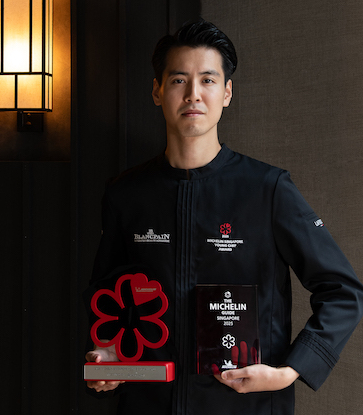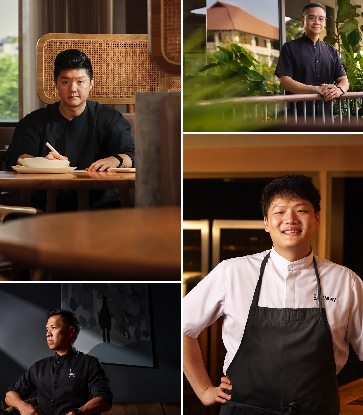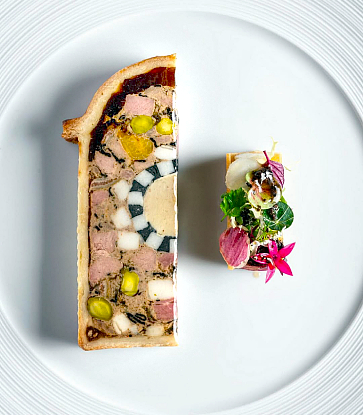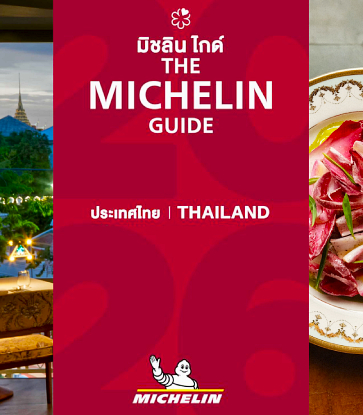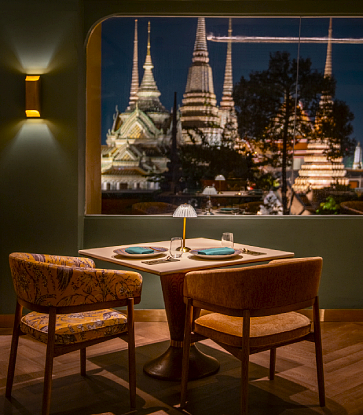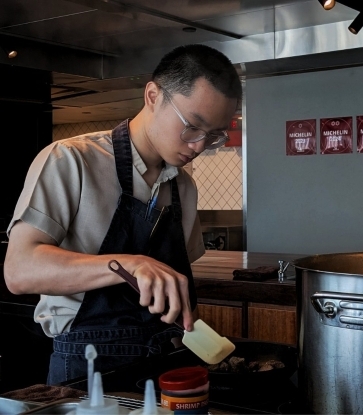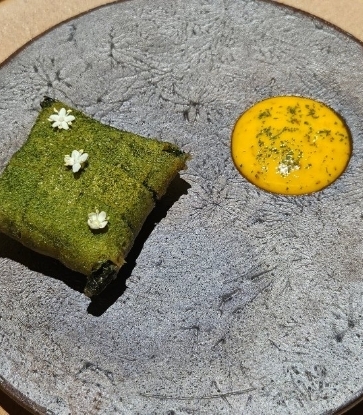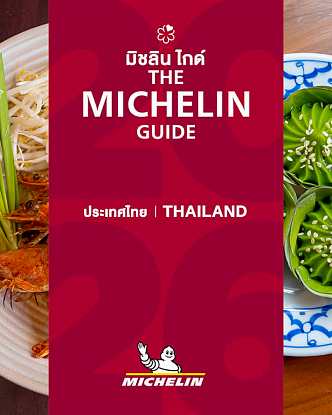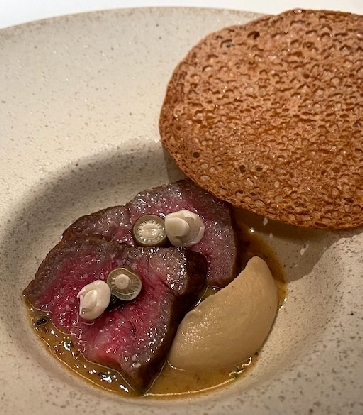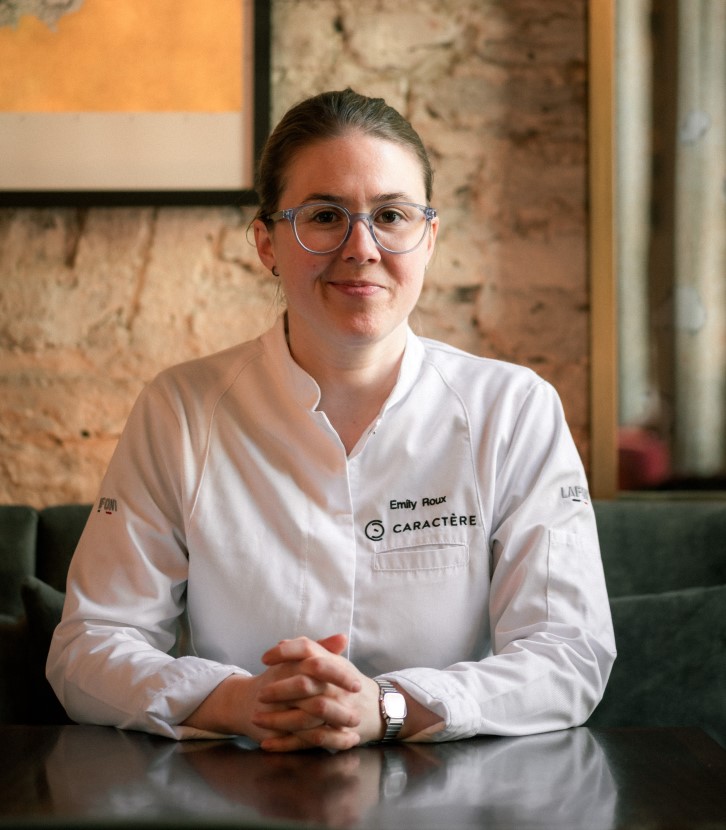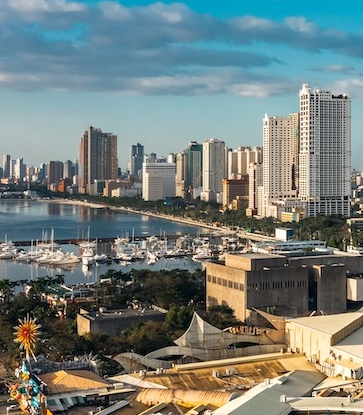Inside the darkened ballroom of the Capella Hotel in Bangkok, a record number of MICHELIN Stars were awarded to Thailand’s restaurants at the 2024 MICHELIN Guide Thailand Ceremony in November 2024.
With dramatic black walls, the venue is bathed in the glow of a giant screen that projects the Guide's iconic red colours and displays the names of each winner. Bright red lights cast a celebratory aura over the venue, illuminating ceiling decorations inspired by the elegant Thai sea – a display of Oceanic Elegance.
Among the winners, four establishments now proudly bear the Green Star, seven received Two MICHELIN Stars and 28 emerged as One MICHELIN Star winners.
We eagerly caught up with the team behind Samrub Samrub Thai—one of the newly minted MICHELIN Star recipients—to speak with them in their moment of glory. Now in high demand, the crew herds Prin Polsuk, his wife, Thanyaporn 'Mint' Jarukittikun, and their team to the corner for photos as press members hover nearby. They pose for the camera, assuming different stances in front of the MICHELIN logos, hugging each other tightly. Jarukittikun and the kitchen staff confidently smile into the camera’s lens, while Polsuk, wearing the fresh white MICHELIN chef’s jacket he has just been awarded, offers a more sheepish grin. He looks down at the floor, his long grey locks covering his eyes, his stately horseshoe moustache presiding over a waterfall of wisdom—a wispy grey goatee descending from his chin.

The couple founded Samrub Samrub Thai in 2017, with the mission to create progressive Thai food that rethinks national cooking traditions. Inspired by time-honoured cooking techniques and rare culinary treasures from the distant corners of the country, Polsuk frequently refreshes the menu with its unique spin on regional dishes, incorporating both traditional methods and near-forgotten recipes.
With the photos done (for now), we managed to find a couple of free seats on a large sofa in the reception area. There’s a flurry of activity around us with chefs, media and hotel staff whizzing by, and the odd well-wisher keen to congratulate the winning couple.
What does receiving a MICHELIN Star mean to you?
Polsuk: “I can’t describe it. We didn’t do it for any awards but we feel grateful to be recognised. We’re just doing what we’ve always been doing. It’s very good for us and our staff. It’s great to recognise the team and the restaurant.”What was the origin of the idea for your restaurant? How did you become a team?
Polsuk: “It started with drinking together – a lot. [the pair exchange glances and a knowing smile.] We eat, we drink, we talk. It’s about happiness through talking, sharing and learning. At the beginning [in 2016], we only did pop-ups in other people’s kitchens. Like Jack’s Bar on the river. We rented the kitchen for the day – cooking refined food. We wanted a more casual setting and invited friends. [It’s a contrast to] Nahm restaurant, in a hotel setting, where everyone has to dress up and it’s 99% foreigners.“We named it Samrub Thai, meaning: ‘for Thai’, because, in the beginning, we focused 100% on locals. We wanted to respect and acknowledge the Thai people. They’re in our thoughts in the things we find and have been eating, and the composition of the dishes and menu.”
Jarukittikun: “I first met Prin when interviewing him [...before the beard]. I was working as a researcher for the United Nations on social development and creative economy for Thailand Creative Design Centre (TCDC). With visits to remote communities and the hill tribes, I worked from a local perspective, on connections with the community. It’s a combination of Prin’s knowledge gained from old cookbooks and working in top restaurants, with my knowledge of provincial Thai communities. And we serve dishes based on our tastes.”
Polsuk: “I was scared the first time I changed the recipes. Take Pad Thai, for instance. We experimented with various methods to create our unique version. We surprised people. And I learned to trust what I did.”

What did you want to be as a child? Could you share your journey of becoming a chef?
Polsuk: [Laughing] “I wanted to be an artist. Making sculptures. I was born into a farming family in the countryside with mountains. We had no dreams. It just happened step by step.“My family home had a local bakery. I started cooking at 31 as I didn’t graduate from university. Then I came to Bangkok for a three-month training programme before going abroad. I worked in Sala Rim Naam [at the Mandarin Oriental] for four years. And I met Chef David [Thompson] and went to London for a year, and then back from London to work as [David’s] head chef in Nahm until 2016.”
Besides David Thompson, who are some of your culinary inspirations or role models?
Polsuk: “Anthony Bourdain – [His book] ‘Kitchen Confidential’ changed me. Before training, I read a lot. It’s hard for me to forget. Now, I still use what I learned. It taught me how to taste food. When you add the fish sauce, when you add the sugar, when you add every ingredient, you taste everything.”Many of the top restaurants focus on modernising Thai cuisine. Why did you choose to preserve traditional Thai methods?
Polsuk: “Previously, we made our recipes based on old cookbooks and what I learned from David Thompson and Nahm. David taught me a lot about how to cook, and the way to think about Thai food. It’s not necessarily about traditional food. The traditional methods [used today], for me, are questionable. They’re not the same. Food for me is more personal. It’s an art. We cook what we want and choose ingredients from everywhere.“We travel a lot on the days when the restaurant is closed. The restaurant is a picture and our discoveries add the colour from our travels. So, the restaurant is a showcase of Thai food from all over the country. We previously changed the menu every month. Now we change it every two months – mostly because we now have a son.
“We explore local village markets on the borders of the provinces to discover foods, ingredients and local knowledge before they disappear – before the knowledge of the old people in the village is replaced by information from YouTube and Google.”

What advice would you give to your younger self or budding new chefs?
Polsuk: “Everything that happened in the past contributes to who you are today. It’s a shared success. My brain doesn’t stay still. [My approach is] turbulent. Uncertain. I keep thinking about the next step. We keep changing the menu. My wife brings a different set of eyes and knowledge – as a woman, a mother and an artist.”Jarukittikun: “It’s about connecting the dots. I wasn’t in this industry before. I was a graphic designer and researcher about community development. So everything is connected. I worked on sustainability projects. The restaurant is more of a platform that connects what we have been doing.
“We want to give back as well. We work with communities and local farmers more than when I was working at the UN – so we’re making it happen through the knowledge and experience we have gained.”
Polsuk: “For me, the possibilities start with family. From my grandma and my mum – there are many things I still remember. But now I’m also inspired by people like our sous chef – Nuttawat Chotikasupa – who has been working with us for nearly ten years. It’s not about the food. It’s about the people. My sous chef keeps me in order. He is more than a colleague. He is family too.”
Jarukittikun: “We already know the food we make is delicious. But now we focus more on the people, the workers, the families – the restaurant is my home. Everybody [staff and the guests] sits together and we become friends. Everybody contributes and we talk together about anything.”
Lastly, do you have any favourite lesser-known Thai dish that you wish people to know about?
Polsuk: “Try larb kwai (buffalo tartare). It’s a manly thing to eat raw. It’s made with a special knife with a curve to mince the meat. It’s very hot. It’s not tourist spicy. It’s directly from the countryside. In the north, it’s more common to use buffalo than cow, because of the perception that it’s cleaner. They previously ate a lot of pig blood and chicken larb. But buffalo is a lot safer. It’s free range. The buffalo only eat grass, not animal feed.” Illustration image: © Akkapat Inthuprapa




